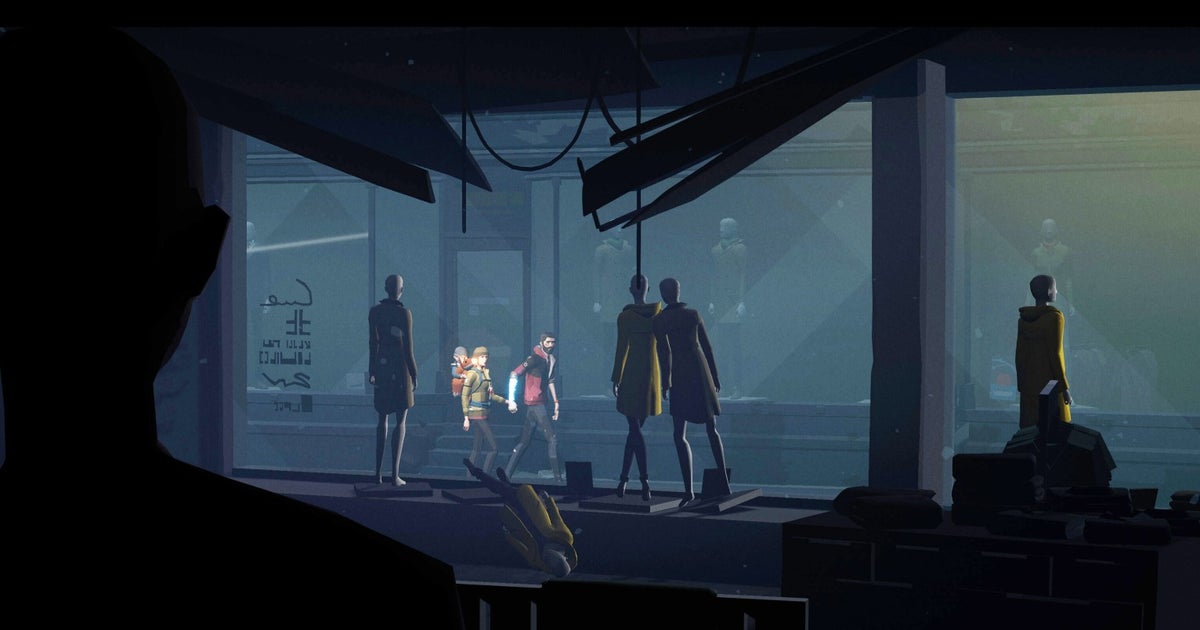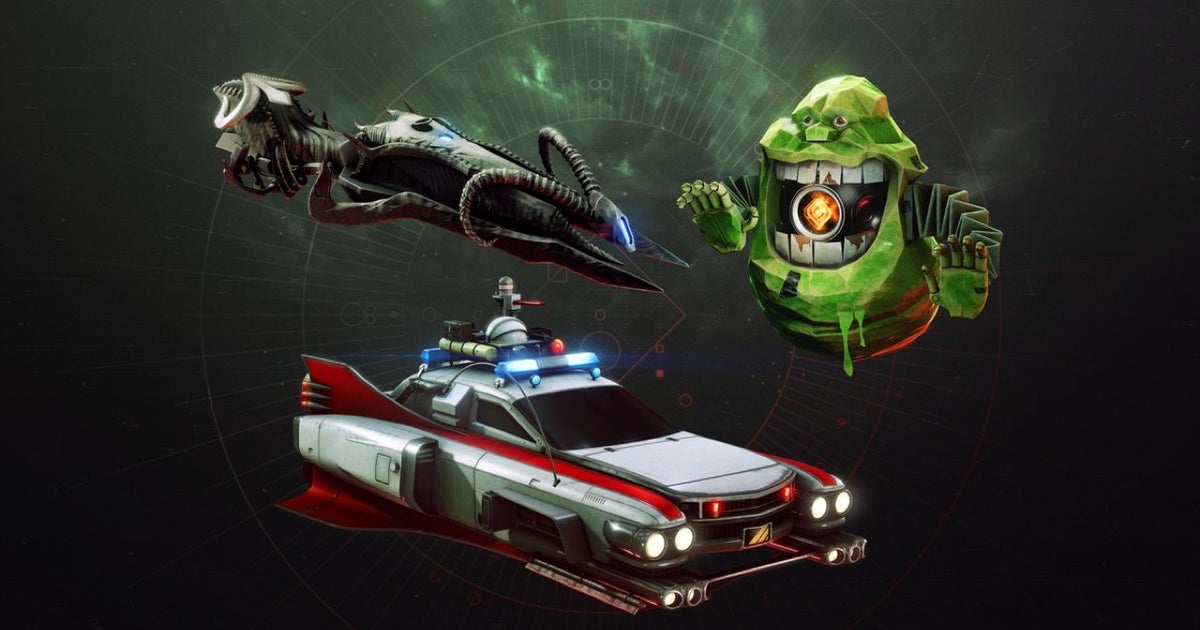Like a combination Taco Bell/KFC, Outpost: Infinity Siege is trying to be a suspicious number of things at once. But while this ambitious and absurdly complicated multiplayer first-person-shooter-real-time-strategy-tower-defense game is absolutely covered in a thick layer of jank, it defies the odds by actually being pretty darn competent at most of the things it attempts. Sure, the story is laughably bad, the voice performances gave me a full-body cringe, and there’s so much grinding and RNG that you’ll be seeing the same levels way too often. But all of those complaints stand in stark contrast to the numerous ways Infinity Siege knocks it out of the park, and as a result I’m still having a lot of fun leveling up my base and facing off against hordes of robotic scorpions after more than 60 hours. The FPS combat is smooth and satisfying, the real-time strategy offers a ton of room for scheming, and the tower defense mechanics delightfully allow you to take on entire armies from atop a fortress of gunfire. Outpost: Infinity Siege might bite off way more than it can chew, but, also like a combination Taco Bell/KFC, it often delivers exactly what you’re looking for.
As a generic soldier in an army that’s waging war against a humanity-hating artificial intelligence, you’ll fight off massive waves of robots by both firing weapons yourself and deploying turrets, traps, and other defensive structures to do the work for you. In between surviving large-scale offensives, you’ll manage a growing base filled with recruitable operatives and vendors with lots off goodies and upgrades on offer, make improvements to a mobile outpost that follows you on missions, and bounce between an incredibly dense series of menus that take a dozen hours to fully comprehend. If that sounds intensely daunting to you, that’s because it is, and Infinity Siege almost seems proud of its needlessly intricate systems, adding more layers to that cumbersome tapestry every couple of hours. I won’t sugarcoat it, folks: learning how to do everything from constructing an outpost piece by piece to modifying your weapons (which have multiple slots to be filled with firing modes and modifiers) is a lot of work, but once you put in the time and effort to do so, it’s incredibly rewarding.
Less time appears to have been put into the story, though, which is terrible from beginning to end. Playing as post-apocalyptic Earth’s least interesting soldier, Fae, you struggle against a man-made artificial lifeform that has driven humanity to the edge of extinction, and fight back by making use of your own AI, who is every bit as robotic and forgettable as her human companion. The dialogue is impressively skippable and filled with cliches and pointless filler, nearly every cutscene is a complete waste of time, and there isn’t a single worthwhile character in the entire cast. Aiding in that commitment to dreadfulness are the absolutely atrocious voice performances, which are delivered so monotone that characters often sound bored out of their minds even during moments that are supposed to be dramatic.These faults aren’t actually a huge dealbreaker in the larger scheme of things, since most of the “plot” is contained to short missions in between the bulk of the adventure. But, man, oh man: it’s real bad.
Infinity Siege clearly focuses much more of its attention on the robot destroying, which is such a big step up from the story it’ll give you whiplash. You’ll spend most of your time doing “tours,” which have you traveling along a series of levels grabbing up as much delicious loot as you can. Once you run low on the electricity needed to keep your mobile base moving, you’ll begin an exciting final extraction event (called Recovery Day) where you enter a standoff against countless robo-baddies and have to hold out until all your loot has been carried away. These encounters mix a whole bunch of cross-genre elements together to awesome effect: one second you’re hopping into the cockpit of a mech to unleash hell upon a giant robot, the next you’re entering Command Mode to build some structures before the next wave of enemies arrives.
Fighting in first-person is shockingly well-tuned for a game that has to juggle so many different genres. You have a multifunctional and highly customizable XEN gun that could be configured to function as a machine gun that does elemental cryo damage, a slow-firing shotgun that makes things explode at close-range, or lots more. You can also take direct control of certain structures on the battlefield, whether it’s a giant cannon to shred the weak point of a boss or a mech you’ve deployed to lay waste to everything in your path. Alternatively, you can stow your weapon and focus on customizing and maintaining the outpost that automates the defense of your cherished core (which will end your run if destroyed), or enter Command Mode to tell any mobile minions or stationary weapons to fire at specific enemies or areas directly, both of which are great options for when you’re facing more enemies than you can handle on foot. Swapping between these three elements throughout a prolonged siege makes for a seriously good time, allowing for very few dull moments in the action.
One clever detail I love about Recovery Day is that the length of time and intensity of the assault you face is determined entirely by the loot you’re trying to extract, so if you hope to make off with rare and powerful items, you’re in for an absolutely devastating onslaught. Even cooler, once you surpass certain loot thresholds, you’ll trigger horrifying bosses to drop from the sky and ruin your escape. To beat the odds and survive a particularly ambitious extraction, you’ll need to come prepared with powerful weapons and armor for your character, make sure the outpost you’re defending has as many defensive and offensive units as possible, and strategically make use of the resources you’ve collected to deploy and command additional units onto the battlefield from a bird’s eye view – and all those juicy options for waging war against these dumb robots makes the end of each tour a high-stakes blast.
While the extraction serves as a tour’s grand finale, much more of your time will likely be spent in each of the small and less exciting levels spread across the map. These mini encounters are pretty slow-paced, involve minimal combat, and mostly have very minor objectives like finding a certain piece of loot or killing four specific enemies – sometimes you can even just move on to the next encounter as soon as you’ve spawned in. The main function of these stages is to search the area for the best loot you can, which is used to upgrade your weapons or armor and build structures for your outpost, and then stuff it into your cargo hold in preparation for Recovery Day – but that doesn’t always make for the most compelling action, as you’ll mostly be scanning shelves, opening crates, and stripping tires from cars. Even worse is that each of the four areas only has a handful of levels you repeatedly visit every tour, meaning you’ll become extremely familiar with the layout of those maps. I even came to recognize individual buildings, which have an identical layout every time they appear, meaning I mostly knew exactly where to search and just had to repeat it time and time again as I gathered loot. In one section of the campaign, I found myself woefully in need of many resources before I was strong enough to beat the area’s boss and advance to the next section, and so spent an entire day replaying the same tour upwards of a dozen times, which got old pretty fast. (I did finish an entire Netflix show while grinding though, so there’s that.)
When you’re not out in the field, you’ll spend your time managing the roughly 50 different RPG systems for upgrading your characters, equipment, base, outpost, and more. It’s a lot. Chief among those is the outpost builder, which allows you to customize the mobile structure you defend while behind enemy lines. The number of gadgets, gizmos, and guns available is impressive, and what starts off as a small box you can decorate with basic turrets eventually becomes a monstrous fortress covered with every kind of booby trap and deadly weapon imaginable, from cryo-freezing frost-throwers to massive long-range cannons that can take down even the most massive bosses with ease – there are even these neat little spring-loaded walls that yeet melee enemies away whenever they get too close. I mostly tried to keep things simple to power through bosses with sheer firepower, but the possibilities for being creative are immense, like how you can use ammo fabricators and conveyor belts to automate the process of keeping your turrets fed with insane Rube Goldberg creations. It’s also great that the cap on how many weapons you can include in your base is limited only by how many you can craft and keep reloaded, and I never once found myself unable to grow my arsenal as I leveled up my outpost’s size and added more and more crazy defenses. I’ve played with enough builders to know you usually run up against some arbitrary limit on how many new pieces of equipment can be added, but in all my time with Outpost: Infinity Siege, I never hit that wall, and that felt very freeing.
Beyond your outpost, you’ll also craft and upgrade guns that can be given different firing modes and a whole bunch of perks, recruit additional, randomly rolled characters to play as on tours instead of Fae (each with their own skill tree), and improve aspects of your base itself by assigning your characters to different duties while they’re idle. If you’re anything like me, you’ll also spend a bunch of time hungrily searching the world for schematics, and will feverishly focus on trying to unlock the technology tree that enables a whole bunch of capabilities, including the ability to craft new and interesting weapons to be added to your outpost. There’s seriously just so much to learn, invest in, and optimize that I sometimes spent an hour or more just hanging out at my base tinkering with things.
Infinity Siege can also be pretty challenging, not because you’re likely to be outright killed in battle unless you’re being extremely reckless, as characters are pretty chunky and easy to heal. Instead, you’ll often find your base overwhelmed by the sheer number of enemies being thrown at you and watch as your core goes up in smoke. Although I love a good challenge, that difficulty definitely backfires when you die, as the penalty for doing so is losing all the items your character is carrying, as well as any items you were hoping to extract from that mission. Even more harsh is that, while Fae has a perk called “Plot Armor” that protects him from death, your other characters can go MIA or be permanently killed, setting you back even more. Normally, I’m all for brutally punishing consequences for failure, but in this particular case all that lost progress means you have to go back out and grind even more and hope you find items to replace your lost loadout. And if you get bad RNG on drops, that could set you back several hours for each dumb mistake. That can start to feel really terrible over time, or worse yet, make you very hesitant to try new levels for fear of biting off more than you can chew, which inspires even more paranoia-fueled grinding.
While I was able to get through every level of Infinity Siege solo in about 60 hours, there’s also multiplayer that lets up to three others join you on tours, or team up for a side activity called Endless Mode, where you take on waves of increasingly deadly enemies and accumulate tons of loot until you inevitably run out of storage space or can’t take the heat any longer. Endless Mode is a great way to get lots of loot quickly, and feels like it was designed with multiplayer in mind thanks to a nonstop intensity that’s made a lot more manageable with friends around. It’s also nice to be able to bypass the more humdrum part of a tour and get straight to the action. Like doing tours solo, playing with friends has its ups and downs since most of the time you’re just on autopilot looting areas for the 50th time, but at least that process goes by a lot faster when friends can help carry the load. Recovery Day is definitely the highlight though, and since anyone can build in Command Mode, take direct control of cannons and mechs, or just run around killing things, it makes for a chaotically fun time. Friends are also likely to have interesting loadouts with mods and armor you’ve not seen before, and you can check out their outposts to see what creative shenanigans they’ve gotten up to.



